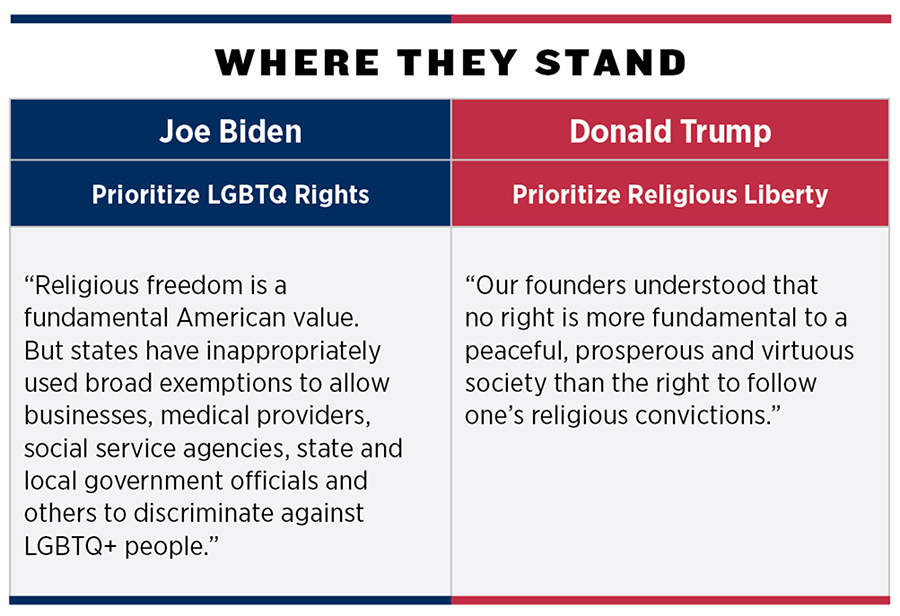Christians have always faced the challenge of living in this world but placing their hope outside of it. Scripture cautions, “Put not your trust in princes … in whom there is no salvation” (Psalm 146:3, ESV). While we cannot put our ultimate trust in any government official or political party, as American Christians we still have the unique privilege of selecting our own “princes.” The 2020 elections offer the challenge and opportunity to elect leaders who will promote the common good and foster virtue and ordered liberty—including religious liberty.
Religious freedom protects the right of Americans to speak and live consistent with their convictions. It also serves to restrain government and allows competing claims about truth in the marketplace. Democracy thrives with robust debate. In fact, countries that vigorously protect religious freedom are more stable, democratic, prosperous and less violent. In the United States, religion contributes greatly to a healthy society and economy. And finally, civil liberties travel together. The loss of religious freedom signals the loss of other freedoms. History confirms this time and again.
As a national legal organization advocating for religious freedom, Alliance Defending Freedom (ADF) has a frontline view of the legal and regulatory landscape. Whom we elect to every public office—from the school board to Congress—matters immensely. Yet there is no higher-stakes race than the one for the presidency. No elected officeholder approaches the authority given our chief executive, which makes it the most important race of all. Thus, Christians must educate themselves on the issues, then prayerfully and wisely vote.
On the issue of religious freedom, the Trump administration has very deliberately tried to establish a favorable record. Since President Trump took office, the Department of Justice (DOJ) has actively intervened in a number of cases involving religious discrimination. And at the U.S. Supreme Court, the DOJ argued alongside ADF in two critical religious freedom victories protecting faithful citizens from being coerced to express themselves in conflict with their religious beliefs.
The DOJ has also filed many briefs in the lower courts supporting First Amendment rights, including cases in which churches have been singled out for special restrictions during the COVID-19 pandemic.

Former Vice President Joe Biden has expressed some support for religious freedom as well. His website affirms that “America was built on a foundation of religious freedom and tolerance” and his “Plan for Safeguarding America’s Faith-Based Communities” promises resources to enhance security for religious gatherings and increasing prosecution for those who commit violence against religious groups. Supporters also emphasize his Catholic upbringing and the Biblical phrases he uses in describing his liberal policies.
Where the two candidates differ most significantly is when religious values conflict with the values of sexual orientation and gender identity. America’s culture and its courts are divided on what it means to be male and female. These differences have major implications for religious freedom.
One significant example: Biden’s promise to make the misleadingly named Equality Act a top priority in his first 100 days. This federal legislation would make sexual orientation and gender identity protected civil rights classes, with no protections for religious organizations or people of faith who hold orthodox beliefs on sexuality as taught by Judaism, Christianity and Islam. It would also gut the landmark Religious Freedom Restoration Act passed by a near-unanimous Congress and signed by President Bill Clinton.
Functionally, the Equality Act would treat churches, businesses, adoption agencies and medical professionals as discriminators if they operate based on the belief that humans are created male and female or that male and female are created for each other. Biden has dismissed exemptions that protect those who hold such beliefs as being “overly broad” and seeking a “license to discrimination.” He promises to apply this view across his administration by reversing many related Trump administration actions.
The two candidates also differ on abortion. President Trump has consistently supported the conscience objections of nuns to paying for abortion drug coverage. Biden opposes such exemptions, even for faith groups. And while Trump has vowed to appoint judges who will overturn Roe v. Wade, Biden has promised to appoint those who will defend it.
The differences between the candidates on the religious freedom issue is clear when we weigh Trump-Pence’s first term against Obama-Biden’s. While a president is never able to achieve all his goals, both the Obama and Trump administrations in their first terms plainly made their marks on religious liberty. Whoever wins this year will greatly impact Americans’ religious freedom.
Finally, we end where we began. There are many reasons why Americans should protect religious freedom, but to do so, we must have the courage to not only defend the right to speak about our convictions, but to openly share the reason for them—the truth about our faith and how it contributes to human flourishing. It is by understanding and sharing our faith that we can shine the light of Christ through the dark clouds of the secular world. ©2020 Kristen K. Waggoner and Jessica Prol Smith
Kristen K. Waggoner is general counsel and Jessica Prol Smith is senior news writer and editor with Alliance Defending Freedom.
Photo: Courtesy of Alliance Defending Freedom
